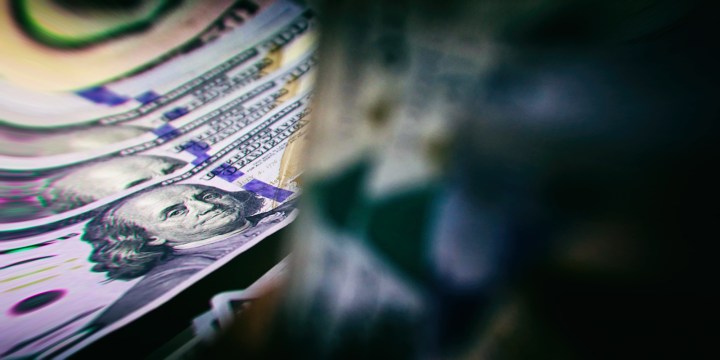ISS TODAY OP-ED
Ethiopia faces tough black market decision on where the forex bucks stop

The choices are stark, but the damaging impact must be mitigated to help improve foreign currency reserves.
Ethiopia’s foreign currency deficit has led to a thriving black market exchange, fuelling already-problematic illicit financial flows in the country. The black market limits the inflow and facilitates the outflow of legitimate foreign currency.
Ethiopia has many unregulated foreign currency exchange bureaus. Profiteers use small shops, usually set up for lawful businesses like boutiques, from where they ask passers-by for foreign exchange. A US dollar is worth double the official bank rate on the black market.
Foreign currency is also diverted through illegal hawala — an informal money transfer outside the banking system. Ethiopians in the diaspora remit foreign currency to middlemen, who pay beneficiaries in Ethiopia in local currency at the black market rate.
Outflows are facilitated by vendors who either smuggle foreign currency collected in Addis Ababa through Bole International Airport, or transport it to Moyale and Togochale, towns on the border with Kenya and Somalia, a researcher told the Enact project. Some foreign currency smuggled through these towns re-enters Ethiopia, only to be sent out again. Illicit traders approach bank officers in border towns with an offer to sell, or vice versa, according to a former federal prosecutor.
Banks in Moyale and Togochale process the foreign currency and disguise it as legitimately earned income from Ethiopian export businesses. A researcher said banks in border towns collaborate with their head offices in Addis Ababa, where someone buys the re-entered foreign currency at a higher price.
The role of banks on the black market isn’t limited to border areas, says National Bank of Ethiopia (NBE) former governor Yinager Dessie. In Addis Ababa, banks pay black marketeers 30 ETB commission for a US dollar, and then sell the foreign currency at a rate above even the black market. Finding a higher bidder is easy — corrupt individuals launder ETB by paying more for hard currency. Importers’ demand for forex is also significantly higher than the supply.
Ethiopia’s foreign currency shortage is exacerbated by ongoing instability. Massive government spending on the war resulted in a foreign exchange reserve outflow of $307-million during the 2020/21 fiscal year. The conflict obstructed foreign currency inflow by limiting tourism and foreign direct investment. It also affected Ethiopia’s access to hard currencies by triggering economic sanctions and the suspension of aid and international loans.
The need to restore peace and stability, along with severe drought and skyrocketing inflation, has occupied government resources and attention, enabling the black market to thrive.
The NBE has tried to manage the shortage of foreign currency through several rules and regulations. Ethiopians travelling abroad can take no more than $4,000 from their foreign currency account, for which proof of travel is required. International traders can spend only 20% of the foreign currency they bring to Ethiopia — 70% goes to the NBE and 10% to commercial banks.
In April 2022, the NBE tried to mitigate inflation by introducing Franco-Valuta, which allows importing of essential foodstuffs without using the banking system to buy or spend foreign currency. This turned the black market into a significant source of forex for Franco-Valuta importers. The ETB lost ground fast — a US dollar overshot from under 65 ETB to over 80 ETB in less than a week. The NBE revised the scheme to require importers to prove they use legally acquired foreign currency.
In May 2022, the NBE suspended commercial banks from providing forex-related services in Moyale and Togochale. In August, the Ethiopian National Intelligence and Security Service (Niss) reported the arrest of several Ethiopian and foreign nationals allegedly involved in illicit financial flows and illegal hawala.
In October that year, the NBE and Niss froze 1,054 bank accounts over black market exchange and illegal hawala. That same month, Ethiopia banned the import of goods deemed non-essential and stopped issuing Letters of Credit for 38 products, from cigarettes and whiskey to non-electric cars imported by private individuals.
Ethiopia may need to rethink its current approach, which focuses on controlling the black market. Rather than intermittent efforts to put out fires, a consistent strategy of controls is required. Last October’s creation of a dedicated task force was useful, as it involves both regulatory bodies and law enforcement agencies. This should be complemented by a holistic government approach that establishes robust inter-agency coordination and cross-border cooperation.
A major difficulty though, is that many Ethiopians believe the black market exchange rate reflects the true state of the economy, not the official exchange rate, say anonymous sources. Government could consider legalising black market exchange and transforming it into a parallel market that the NBE can regulate. If legalised, such transactions could be recorded, taxed and used to support international trade.
However, legalisation might presuppose adopting a floating exchange rate, which can work best with a system that maintains a sustainable source of foreign currency, according to an expert who requested anonymity. This would probably result in considerable devaluation of the currency, which the government is unlikely to accept.
Ethiopia’s government faces difficult choices — but a decision must be made in order to limit the damaging effects of the black market exchange and improve foreign currency reserves. DM
Tadesse Simie Metekia, Senior Researcher, Horn of Africa, Enact Project, Institute for Security Studies (ISS) Addis Ababa and Messay Asgedom Gobena, Assistant Professor, Ethiopian Policy University
This is an article of the Enact project, which is funded by the European Union and implemented by the Institute for Security Studies in partnership with Interpol and the Global Initiative against Transnational Organized Crime.
First published by ISS Today.

















Comments - Please login in order to comment.